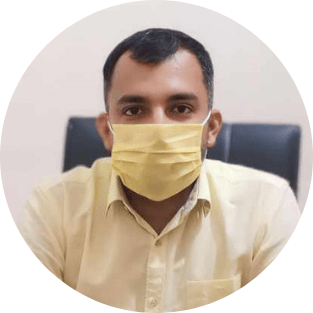
















































































We apologize, but we were unable to find any doctors matching your search criteria. Please try adjusting your search filters or broaden your criteria for better results.
Thank you for your understanding.
Saline solution nasal irrigation, steam inhalation, over-the-counter or prescription drugs to treat symptoms and lessen inflammation, and, in some situations, antibiotics or corticosteroids are used as treatments for sinusitis. Surgery might be necessary in severe or persistent situations.
If you have persistent or repeated problems involving your ears, nose, or throat, such as chronic sinusitis, recurrent ear infections, swallowing issues, voice changes, hearing loss, or nasal obstruction, you might think about consulting an ENT specialist.
Sinusitis, allergies, ear infections, tonsillitis, laryngitis, hearing loss, tinnitus, vertigo, nasal polyps, deviated septum, snoring, and sleep apnea are just a few of the common ENT diseases.
An otolaryngologist, often known as an ENT specialist, is a physician who focuses on identifying and treating diseases of the ears, nose, throat, and other head and neck tissues.
Yes, allergies can cause problems with the throat, nose, and ears. Hay fever symptoms such as postnasal drip, itching, and nasal congestion can be brought on by allergic rhinitis. Additionally, allergies may cause sinusitis, ear infections, or worsen asthma symptoms.
Yes, allergies can affect the ears, nose, and throat. Allergic rhinitis (hay fever) can cause symptoms like nasal congestion, sneezing, itching, and postnasal drip. Allergies can also contribute to sinusitis, ear infections, and exacerbate symptoms of asthma.
Noncancerous growths called nasal polyps can form in the nasal passageways. Saline nasal sprays, oral corticosteroids, nasal sprays with corticosteroids to minimise inflammation, and surgical removal are a few examples of possible treatments.
Nasal polyps are benign growths that form in the lining of the sinuses or the nasal passages. They are typically caused by persistent inflammation of the nasal and sinus mucosa and are soft and painless. Nasal polyps can appear in one or both nostrils and range in size and quantity.Nasal polyp symptoms can include: nasal blockage and congestion, clogged nose, Reduced ability to taste and smell Pain or pressure in the face, Nasal post-drip, Snoring or (in severe cases) sleep apnea.
By making lifestyle adjustments including losing weight, abstaining from alcohol and sedatives before bed, and sleeping in specific positions, snoring and sleep apnea can be controlled. In more severe situations, continuous positive airway pressure (CPAP) therapy, oral appliances, and surgical procedures may be advised.
Common causes of hearing loss are genetic factors including hereditary and non-hereditary hearing loss birth asphyxia,chronic ear infections, age-related sensorineural degeneration,trauma to the ear or head, loud noise/loud sounds,nutritional deficiencies